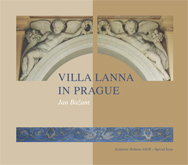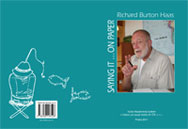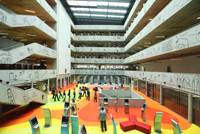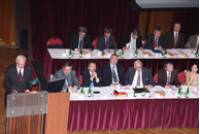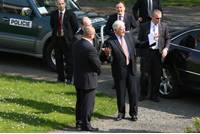
Academic bulletin 06/2006
EVENT OF THE MONTH
The meeting of the V4 Academies
Presidents and representatives of four Academies of Sciences from the so-called Visegrád countries, including the Czech Academy of Sciences, met at Villa Lanna in Prague on April 24–25, 2006. They signed an Annex to the Agreement on Scientific Cooperation between the Academy of Sciences of the Czech Republic and the Slovak Academy of Sciences, awarded young Researcher in Structural and evolutionary biology and discussed about the next cooperation, European research and worldwide happening in Science. Academic Bulletin interviewed with the presidents of four Academies.
TOPIC OF THE MONTH
Ukrainians honor Josef Hlávka
The founder of Czech Academy of Science and Art, Josef Hlávka is considered in Czech Republic as the most renowned civil patron. But in Ukraine he is well known mainly as an architect and artistic personality.
SCIENCE AND RESEARCH
Pandemy, night moth of the world
The Council for Popularization of Science organized on 19th April a conference devoted to an epidemic of 21st century. Czech experts discussed mainly the epidemic of flu, Prions illnesses, Sars and AIDS.
The trail of the Martinická Bible from the 15th to 21st centuries
The 15th century Martinická Bible was included in the exhibition, "Charles IV, Emperor by the Grace of God," at the Prague Castle. It was lent from Library of the Academy of Sciences of the Czech Republic.
ANNIVERSARY
Institute of Analytical Chemistry ASCR
The history of the Institute began in 1956 when the Laboratory for Gas Analysis was established by transfering a small research group from the Institute for Petroleum Research in Brno to the former Czechoslovak Academy of Sciences. The leader of the original research group was Jaroslav Janák. He served as the first director of the Institute until 1980, and the Institute gained widespread international recognition under his leadership. Academic bulletin interviewed Professor Janák.
INTERVIEW
Equity, fairness and trueness should be the ground
In an interview, Prof. H. Illnerová talked about the New Ethic Codex for scientists of ASCR.
BRUSSELS
A visitor at a meeting of representatives of European Liaison Offices of IGLO was Dr. William Cannell, leader of the Department of Emerging technologies who introduced the ‘Ideas’ programme proposed for FP7. The ‘Ideas’ programme seeks to enhance the dynamism, creativity and excellence of European research at the frontier of knowledge by supporting "investigator-driven" research projects carried out across all fields by individual teams in competition at the European level. EU frontier research work is to be implemented by a European Research Council (ERC), composed of a scientific governing council and a dedicated implementation structure.


 Česky
Česky

